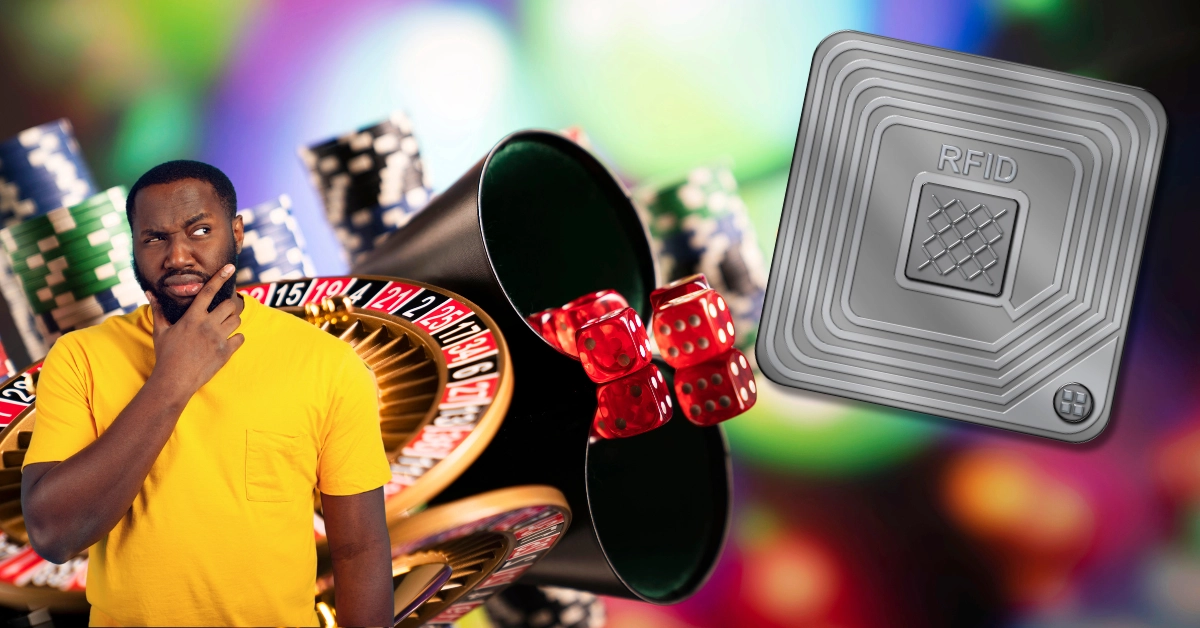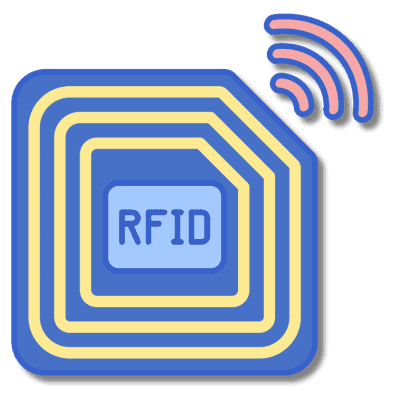RFID Technology in Casino Chips: Tracking, Security, and Beyond

RFID technology has been quietly inching its way into industries that rely on precision and productivity. What is RFID? It stands for Radio Frequency Identification, and it’s the tech that uses electromagnetic fields to automatically identify and track objects that have small tags attached to them.
Every tag has a microchip that stores data, which is then transmitted to an RFID reader via radio waves. The reader captures the info and sends it to a computer system for processing. It’s sort of like barcodes but way more advanced. Why? Because RFID doesn’t need a direct line of sight to scan and can track multiple items simultaneously!
It powers the logistics behind all of your Amazon orders, streamlines inventory in retail, and makes sure that hospital patients get the necessary care. But how does this tech work on casino floors? Those chips on the table are no longer mere markers of value—they are tiny pieces of tech that are loaded with info.
It’s a logical move for the gambling world to integrate RFID-embedded chips—not only is it a way to track chip movement, but there are extra perks that make casinos more secure, optimized, and player-friendly! And it doesn’t stop there—the innovation hints at possibilities that go far beneath the surface benefits.
What Is RFID Technology?
RFID is just a fancy way of saying “tech that tracks stuff wirelessly.” It’s a system that uses electromagnetic fields to transmit any info that is stored in tiny tags to a reader. The tags can be placed on anything—products, equipment, or, in this particular scenario, casino chips.
The system works like this:
- RFID Tags: The tags are where the “wow factor” happens—each one has a chip with distinctive data and a teeny antenna that sends that data to a reader.
- RFID Readers: These act just like scanners and are always “listening” to any signals from tags that are nearby.
- Data Systems: Once the readers pick up a signal, the info is then sent to a software system that organizes and analyzes the data.

It’s not hard to see why RFID tech has become such a powerhouse in a lot of industries. Retailers use it to keep shelves stocked without over-ordering; hospitals use it to make sure that the right patient gets the right medication. And shipping companies use RFID to keep tabs on packages that travel thousands of miles. So, why not casinos, too?
The Role of RFID in Casino Chips
The gambling industry has welcomed RFID with much anticipation—because when there’s money on the line, you can never be too careful. Unlike those conventional casino chips, which are basically just colorful pieces of clay or plastic, RFID-enabled chips come with built-in tech that communicates with readers that are scattered around the casino. The readers track everything from the chip’s value to its exact location at any given time.
Big-name casinos in places like Las Vegas, Macau, and Singapore have already made the switch to RFID chips. Why? Because they not only make life easier for the casino operators but they also add more security that just wasn’t possible before. Plus, it’s not just the high-rollers’ chips getting the tech upgrade—every token, from the smallest denominations to the big boys, can be RFID-enabled.
It’s easy to see why so many casinos are hopping on board with the idea—RFID chips will change the way casinos operate! They’ll turn conventional gaming floors into super smart, interconnected systems.
Enhanced Tracking and Inventory Management
Have you ever thought about how in the world casinos are able to keep tabs on the thousands of chips that are scattered across countless tables, machines, and cashier counters? That’s where RFID chips come in—it’ll make it so much easier for everyone involved. The chips are teeny beacons that tell the casino exactly where they are, 24/7, 365.
What does this mean for casino operators? The following:
- Real-Time Tracking: Casinos will be able to see exactly where their chips are at all times. Are they on a roulette table, in someone’s pocket, or at the cashier? Wherever they are, they’ll know without a doubt.
- Better Inventory Control: Knowing exactly how many chips are in circulation at all times and that means no losses, decreases shrinkage and keeps operations running like a well-oiled machine.
- Quick Reconciliation: At the end of the day (or night), casinos can tally up all of their chips without going through a manual count, and that saves a ton of time and effort.
A lot of casinos are using RFID readers at cashier booths to verify each and every chip’s authenticity before payout. So, if someone does try to pass off a fake chip, it’ll get flagged immediately. It’s a level of control that wasn’t possible with the standard chips, and that makes RFID an amazing step forward for productivity and security.
Improved Security and Fraud Prevention
RFID isn’t only about tracking—it’s also a major weapon against fraud and theft. Why? Because chips that have RFID tech are pretty much impossible to counterfeit because each one has a unique identifier that’s tied to a specific casino’s system. That means that even if someone manages to make a near-perfect replica, it won’t get past the casino’s scanners.
And then there’s the issue of stolen chips—in the past, a big robbery would leave casinos with almost no recourse or a good way to track down the stolen tokens. But with RFID? That all changes. Chips can be tracked in real time, and that means that casinos can deactivate stolen ones as well as trace them back to their last known location.
Want a fun example? There was an infamous Bellagio heist in Las Vegas, and a thief made off with stacks of chips—but RFID tech meant that the casino was able to track and deactivate them. The stolen loot became useless plastic. There was no score for the thief, but it was a win for security!
Player Tracking and Behavioral Insights
RFID chips don’t only help out casinos—they also reveal a lot about how players are interacting with games. Because they’re integrated into casino management systems, the chips can track betting patterns, game preferences, and how long a player spends at a particular table.
This info is a golden ticket for casinos, as it helps them tailor promotions and rewards, and in some instances, the gaming floor layout will be altered to match player behavior. But, of course, this kind of tracking comes with its own set of ethical considerations. Most people aren’t over the moon about the idea of being monitored so closely, which is why transparency and player consent are really important issues.
Beyond Security: Enhancing the Casino Experience
RFID technology is also changing how some players interact with casinos. One of the best perks for players is faster, hassle-free cash-outs. You can just take your chips to the cashier and have them scanned instantly—no delays or any manual counting. Sure, it seems like a small thing, but in the grand scheme of it all? It makes a noticeable difference in creating a more streamlined gambling experience.
Casinos are also getting more creative by integrating RFID with loyalty programs. High rollers can be automatically rewarded with perks that are all based on their play, and it’s all thanks to the real-time data RFID provides. But wait—there’s more! With the rise of hybrid casinos (which are a combo of physical and online gambling sites), RFID chips are finding a home in the innovative setups where live games and online platforms have begun to overlap.

This use of technology lines up with the broader trends in the gambling industry, where tools like AI are being utilized to make casinos safer and more sophisticated. RFID is just one piece of a much bigger puzzle when it comes to tech innovation in gambling.
Challenges and Limitations of RFID in Casino Chips
There are lots of advantages that come with RFID technology, but there are a few limitations and challenges we need to go over.
- For one thing, the initial cost of implementing these types of systems can be really pricey. Casinos will have to upgrade all of the chips, install readers, and integrate the technology with already existing casino management systems, and that takes a sizable upfront investment. And while the major casinos in gaming hubs like Las Vegas or Macau can obviously afford it, smaller operators will probably find the costs to be prohibitive.
- There’s also the issue of technology gremlins, aka malfunctions. RFID systems all rely on flawless communication between chips, readers, and backend software. Any kind of a disruption—whether from technical glitches or external interference—could cause errors that affect casino operations. And, as with any tech, the danger of hacking or tampering is always a real concern, and that will mean that casinos will have to invest and adopt stronger cybersecurity measures.
- Lastly, not everyone in the gambling industry is champing at the bit to welcome these kinds of changes. Some traditionalists argue that old-school chips have their charm and that over-reliance on tech could take away from the real casino experience. Convincing every stakeholder of RFID’s benefits? That will be an ongoing challenge.
The Future of RFID Technology in Casinos
The potential of RFID in casinos is still being unlocked, but there are some pretty cool developments that are on the horizon. Experts predict further integration with AI and IoT (Internet of Things), which will create a hyper-connected gaming environment. RFID-enabled chips would work seamlessly with AI systems that analyze player behavior in real time and that tailors experiences in ways we can only imagine.
It’s pretty clear that the tech has the potential to turn casinos into safer, smarter, and more cutting-edge hubs for entertainment.
There’s also been talk of RFID playing a role in cashless gambling systems, and this is where chips and cards could eventually merge. As data security measures improve, RFID technology could become even more advanced, and that would address any current risks while also opening up new possibilities.
Conclusion: Rolling the Dice on RFID
There is a new sophisticated tech making its way onto the gambling scene, and it will benefit casino operators and the players who frequent casinos! What do they have to offer? Only the most precise tracking, better inventory oversight, improved security, and more customized player experiences. To us, the advantages are obvious and undeniable—only time will tell if casinos and gamblers agree.
Below is a quick recap of how and why RFID-enabled casino chips are changing the way that casinos do business:
- Accurate Tracking: Chips are able to be monitored across the casino floor with unmatched precision.
- Stronger Security: Counterfeiting and theft are substantially decreased via unique identifiers that are embedded in each chip.
- Operational Streamlining: Faster cash-outs and automated systems cut back on errors and are time-savers.
- Player Insights: Casinos will be better able to understand player behavior, and that means more personalized rewards and services.
With RFID getting tagged (yes, pun is intended) into the game, casinos are ready to make a solid bet on the future.
Do you have any thoughts or opinions on how the newest tech will influence the gambling experience? Tell us all of your thoughts—we always want to hear them!

Matthew specializes in writing our gambling app review content, spending days testing out sportsbooks and online casinos to get intimate with these platforms and what they offer. He’s also a blog contributor, creating guides on increasing your odds of winning against the house by playing table games, managing your bankroll responsibly, and choosing the slot machines with the best return-to-player rates.








